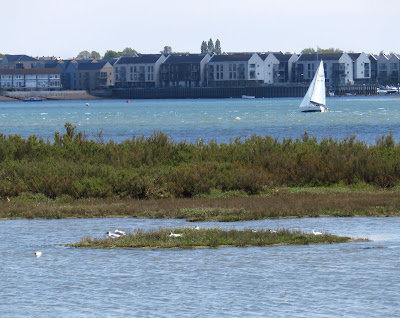A red kite passed slowly above Firs Chase in mid afternoon on Tuesday 21st and provided nice clear views above the front door-step of the house. It circled for a short while and picked up a bit of height before drifting north towards the Strood Channel. Two common buzzards were also seen high up following behind the red kite.
The previous day a black kite was seen flying over the fields by the Strood seawall mid morning on Monday 20th. It appeared to fly north from the direction of the caravan site, heading towards the bottom of the Strood Hill before it circled slowly and then drifted south-east back up the hill to the Glebe and then headed eastwards and lost to view. Having recognised the bird as a kite to start with, the wings and body seemed too dark for a red kite and the tail wasn't as deeply forked as a red kite's. The tail only had a short fork when it flew and when it circled the tail was almost square ended when it was opened, typical of black kite.
The black kite was seen at about 9.20am on Monday for only about two minutes before it disappeared east. Presumably the same bird was then seen again further along the Essex coast at Holland Haven Country Park at 11.50. It was still in the area between 12.30 and 12.45pm but not seen again after this.
The black kite is a nationally rare vagrant from the continent and has only previously been seen about 20 times in Essex before - but not Mersea.
Other birds of prey seen on Monday 20th by the Strood included a hobby racing over the fields towards Ray Island, also a kestrel and a common buzzard. Raptors seen by Andy Field from his High Street North garden included at least 3 hobbies, kestrel, sparrowhawk and common buzzard.
On Tuesday 21st three avocets were seen on the saltmarsh lagoon near the East Mersea Golfhouse, also three black-headed gulls that looked like they were on nests. Two little egrets and four shelduck were seen nearby while 35 ringed plover and 5 dunlin were in two flocks at the mouth of the Pyefleet Channel.
One common tern, male marsh harrier were seen and a lone brent goose was seen on Langenhoe Point. Two house martins were by the Golfhouse and 4 by the Oyster Fishery and two reed warblers were singing by the dyke.
Other birds seen along the Strood channel on Monday 20th included a pair of shelduck on the seawall. Six greylag geese and a male pochard were seen in flight and the gadwall and little grebe were on the dyke. Six Mediterranean gulls, two common terns and a whimbrel were also noted.
A cuckoo was calling near the caravan site, 5 swifts, 8 swallows, 3 house martins, yellow wagtail, 5 singing reed warblers and 20 linnets were also noted. A pair of house martins was gathering mud from the Hard, not a wise decision using salty mud to build their nest in nearby City Road.
A cockchafer was found in the moth trap on Saturday 18th in Firs Chase. Only ten moths dropped into the trap before midnight, mainly shuttle shaped darts, oak-tree pug and a brimstone moth.
Tuesday, 21 May 2019
Subscribe to:
Post Comments (Atom)





No comments:
Post a Comment